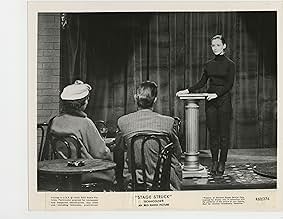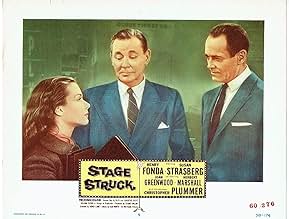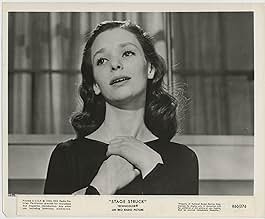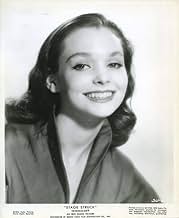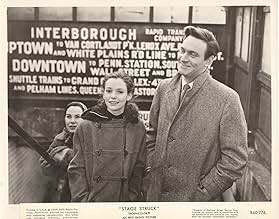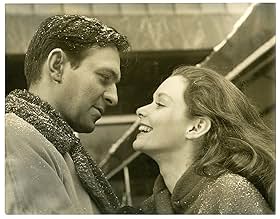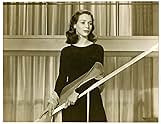IMDb-BEWERTUNG
5,9/10
876
IHRE BEWERTUNG
Füge eine Handlung in deiner Sprache hinzuA young woman arrives in New York City determined to become a great theatrical star, but discovers that her goal may not be as easily attainable as she had hoped.A young woman arrives in New York City determined to become a great theatrical star, but discovers that her goal may not be as easily attainable as she had hoped.A young woman arrives in New York City determined to become a great theatrical star, but discovers that her goal may not be as easily attainable as she had hoped.
- Regie
- Drehbuch
- Hauptbesetzung
Pat Harrington Sr.
- Benny
- (as Pat Harrington)
Pat Englund
- Gwen Hall
- (as Patricia Englund)
Merle A. Ashley
- Minor Role
- (Nicht genannt)
Dario Barri
- Handsome Young Man
- (Nicht genannt)
Rolly Bester
- Minor Role
- (Nicht genannt)
Leon Bibb
- Guitar Player
- (Nicht genannt)
Empfohlene Bewertungen
There is a strange artificiality to Susan Strasberg's performance which really throws this movie off kilter. Obviously she's playing a very theatrical young woman who lives for the stage, and in certain scenes (particularly the party scene where she is not only intoxicated from champagne but the dreamy proximity to so many Broadway celebrities) this technique is effective, but she never turns it off. In tender, heartfelt moments with Henry Fonda's seasoned producer and Christopher Plummer's blossoming playwright, both of whom are supposed to be madly in love with her, she's frightfully unresponsive. She's like a pretty little China Doll whose eyes can blink.
Nevertheless, there is much to like about this film. Fonda, Plummer and Herbert Marshall are superb as various incarnations of success who all become enchanted with Strasberg and her bewildering determination to be a star. They are all caught up in the complicated and decidedly unromantic machinery of the theatre world, and she represents the innocence they've either forgotten (Marshall), lost (Fonda), or are in jeopardy of losing (Plummer). (Although again, as Strasberg plays her, the innocence seems like a put-on, a florid, elaborate joke.) Part of the pleasure of the film is seeing Plummer in one of his very first, pre-"Sound of Music" roles. A darkly compelling leading man during this time with brooding traces of the new method acting style, he and the old school Fonda work well together - there's an interesting "passing the torch" dynamic there.
But the real reason to see this film is the stunning location photography of New York City. The director, Sidney Lumet, has always loved the city just as much as Woody Allen, and here it is practically the star. There is an exquisite scene in a snow blanketed park (Central?) that is as vivid as being there.
There is an added poignancy to this picture as Strasberg's part as an actress on the verge of "making it" was, I believe, intended to neatly dovetail with her own emerging stardom. A stardom that was, alas, to be short-lived.
Nevertheless, there is much to like about this film. Fonda, Plummer and Herbert Marshall are superb as various incarnations of success who all become enchanted with Strasberg and her bewildering determination to be a star. They are all caught up in the complicated and decidedly unromantic machinery of the theatre world, and she represents the innocence they've either forgotten (Marshall), lost (Fonda), or are in jeopardy of losing (Plummer). (Although again, as Strasberg plays her, the innocence seems like a put-on, a florid, elaborate joke.) Part of the pleasure of the film is seeing Plummer in one of his very first, pre-"Sound of Music" roles. A darkly compelling leading man during this time with brooding traces of the new method acting style, he and the old school Fonda work well together - there's an interesting "passing the torch" dynamic there.
But the real reason to see this film is the stunning location photography of New York City. The director, Sidney Lumet, has always loved the city just as much as Woody Allen, and here it is practically the star. There is an exquisite scene in a snow blanketed park (Central?) that is as vivid as being there.
There is an added poignancy to this picture as Strasberg's part as an actress on the verge of "making it" was, I believe, intended to neatly dovetail with her own emerging stardom. A stardom that was, alas, to be short-lived.
Susan Strasburg was method acting guru Lee Strasburg's daughter.The film is peppered with acting luminaries such as Henry Fonda, Christopher Plummer and Herbert Marshall. I was however strongly reminded of a film on a rather similar theme "All about Eve" where again an ambitious young novice actress seeks to advance her career - at the expense of ageing actress played by Bette Davis. The screenplay by Joseph L. Mankiewicz has become immortal as in "Fasten your seatbelts, it's going to be a bumpy night! ".
Not one line of Stage Struck is memorable. My attention was only briefly attracted by something surely unintended around 30 minutes in. Strasburg, Fonda and Herbert Marshal perform part of a Shakespeare play. Henry Fonda was OK but Susan Strasburg quacked and gave no indication of promise even. But Herbert Marshall spoke his lines wonderfully. Marshal, I suddenly realised had wasted and misdirected his talents, not least here.
Interesting Herbert Marshall trivia: During the First World War, Marshall served ... with fellow actors Basil Rathbone, Ronald Colman, Cedric Hardwicke and Claude Rains. (Wikipedia) Coincidentally perhaps the greatest and most distinctive vocal talents in cinema history.
Not one line of Stage Struck is memorable. My attention was only briefly attracted by something surely unintended around 30 minutes in. Strasburg, Fonda and Herbert Marshal perform part of a Shakespeare play. Henry Fonda was OK but Susan Strasburg quacked and gave no indication of promise even. But Herbert Marshall spoke his lines wonderfully. Marshal, I suddenly realised had wasted and misdirected his talents, not least here.
Interesting Herbert Marshall trivia: During the First World War, Marshall served ... with fellow actors Basil Rathbone, Ronald Colman, Cedric Hardwicke and Claude Rains. (Wikipedia) Coincidentally perhaps the greatest and most distinctive vocal talents in cinema history.
Before this film, I had seen Susan Strasberg in two late 1960s AIP low-budget films 'The Trip' and 'Psych-Out' and enjoyed her performances in both so was quite interested in seeing her in the starring role here.
Alas, not only is she not up to the task, but she takes down the film with her. Her performance in the first 30 minutes or so is truly wretched; she's so strained and overwrought that it makes one cringe.
To be fair, from the time she does a reading from 'Romeo & Juliet' (which is quite charming) her performance settles down somewhat but the damage is done. After all, it's in the opening scenes where we're supposed to believe that she wins over Herbert Marshall as a close friend and enchants Plummer and Fonda but her performance kills any chance of that being convincing and the film never recovers.
However, the film is still fairly entertaining. While Fonda seems rather too genial to convince as a Broadway producer he's always entertaining to watch and helps hold the film together. And Joan Greenwood does a nice balancing act as she gives a melodramatic performance yet still lined with depth.
And, as other reviewers have mentioned, director Sidney Lumet puts in some nice touches with the detail he displays in the preparation that goes behind the scenes for opening night.
Also of interest is that it was released as an RKO picture and was probably close to the very last film released by that studio.
Alas, not only is she not up to the task, but she takes down the film with her. Her performance in the first 30 minutes or so is truly wretched; she's so strained and overwrought that it makes one cringe.
To be fair, from the time she does a reading from 'Romeo & Juliet' (which is quite charming) her performance settles down somewhat but the damage is done. After all, it's in the opening scenes where we're supposed to believe that she wins over Herbert Marshall as a close friend and enchants Plummer and Fonda but her performance kills any chance of that being convincing and the film never recovers.
However, the film is still fairly entertaining. While Fonda seems rather too genial to convince as a Broadway producer he's always entertaining to watch and helps hold the film together. And Joan Greenwood does a nice balancing act as she gives a melodramatic performance yet still lined with depth.
And, as other reviewers have mentioned, director Sidney Lumet puts in some nice touches with the detail he displays in the preparation that goes behind the scenes for opening night.
Also of interest is that it was released as an RKO picture and was probably close to the very last film released by that studio.
Although Susan Strassberg has been unfairly compared to Katharine Hepburn from the original Morning Glory, it's not quite a fair comparison. Forgetting that there is no one like Hepburn, Strassberg does do a decent job with the material given in Stage Struck. The problem is that the story has been changed and not for the better.
Romance was added to this production and it weakens the basic story of a young girl who is so single minded in her determination to be a success in the theater. The characters played by Adolphe Menjou and Douglas Fairbanks, Jr. in Morning Glory are now played by Henry Fonda and Christopher Plummer. The producer and the playwright now engage in a rivalry for Strassberg which weakens the story.
In the original Morning Glory it's made clear from the beginning that Menjou is a love 'em and leave 'em type and he's really got no interest in Hepburn in that direction as he sees she's not the type. Pipe smoking Fairbanks after Hepburn makes good would like to get something going with her, but she's into her art first and for always.
But Fonda and Plummer have a civilized rivalry for Strassberg and the story is which one will she choose. That I'm not telling.
Stage Struck has some nice location shots of New York in the late Fifties, Broadway and the Greenwich Village area and a bit of Park Avenue. Joan Greenwood is here as the star who falters and allows Strassberg her big break. Greenwood's quirky personality that British films utilized so well is strangely missing here. Herbert Marshall is great as the older actor that C. Aubrey Smith played in Morning Glory.
Stage Struck is a nice film, but definitely a come down from Morning Glory.
Romance was added to this production and it weakens the basic story of a young girl who is so single minded in her determination to be a success in the theater. The characters played by Adolphe Menjou and Douglas Fairbanks, Jr. in Morning Glory are now played by Henry Fonda and Christopher Plummer. The producer and the playwright now engage in a rivalry for Strassberg which weakens the story.
In the original Morning Glory it's made clear from the beginning that Menjou is a love 'em and leave 'em type and he's really got no interest in Hepburn in that direction as he sees she's not the type. Pipe smoking Fairbanks after Hepburn makes good would like to get something going with her, but she's into her art first and for always.
But Fonda and Plummer have a civilized rivalry for Strassberg and the story is which one will she choose. That I'm not telling.
Stage Struck has some nice location shots of New York in the late Fifties, Broadway and the Greenwich Village area and a bit of Park Avenue. Joan Greenwood is here as the star who falters and allows Strassberg her big break. Greenwood's quirky personality that British films utilized so well is strangely missing here. Herbert Marshall is great as the older actor that C. Aubrey Smith played in Morning Glory.
Stage Struck is a nice film, but definitely a come down from Morning Glory.
Along with "All About Eve" this is one of the finest films dealing with the American theatre. I don't understand why it is a lost film and would urge anybody who enjoys great acting to hunt this film down any way they can. It is also about time it was released on video. Susan Strasberg was clearly one of Hollywood's casualties and it's tragic that the films she made after this were perhaps determined by the mediocre reaction at the time to this film.
WUSSTEST DU SCHON:
- WissenswertesEva Lovelace (Susan Strasberg) is told to join the Actors Studio to learn her craft. In real life, Strasberg was the daughter of Lee Strasberg, the acting coach and director of the studio.
- Zitate
Lewis Easton: [to Eva] You're a hungry little girl - the theater's offering you a feast.
- VerbindungenFeatured in Hollywood the Golden Years: The RKO Story: Howard's Way (1987)
Top-Auswahl
Melde dich zum Bewerten an und greife auf die Watchlist für personalisierte Empfehlungen zu.
- How long is Stage Struck?Powered by Alexa
Details
- Laufzeit1 Stunde 35 Minuten
- Farbe
- Seitenverhältnis
- 1.37 : 1
Zu dieser Seite beitragen
Bearbeitung vorschlagen oder fehlenden Inhalt hinzufügen

Oberste Lücke
By what name was Eines Tages öffnet sich die Tür (1958) officially released in India in English?
Antwort

